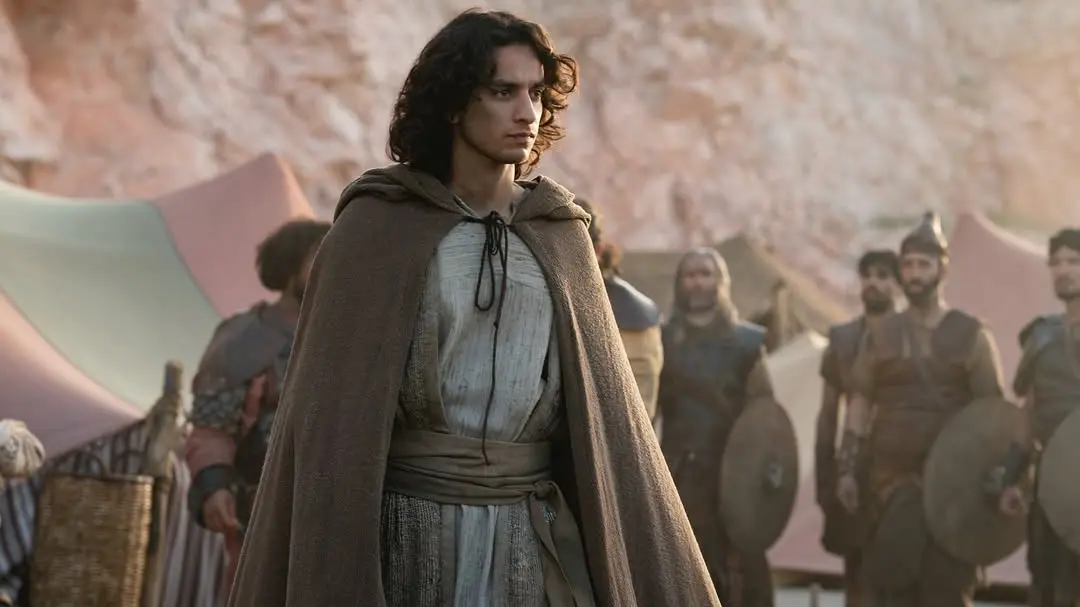House of David season 2 episode 2 ending explained: What does David’s triumphal entry into Gibeah mean?
-
 House of David Season 2 via @watchwonderproject
House of David Season 2 via @watchwonderprojectHouse of David season 2, episode 2, "A Journey Home," premiered October 5, 2025, on Wonder Project via Prime Video. Crafted by Jon Erwin and Jon Gunn, the creative duo behind Jesus Revolution and I Can Only Imagine, this biblical drama reimagines 1 Samuel with visceral intensity. Michael Iskander’s David, a shepherd-turned-warrior with Broadway-honed gravitas, navigates his meteoric rise after slaying Goliath.
Episode 2 takes the pulse down from the Goliath clash of season 1 by parsing the ramifications of David's victory. In Gibeah, the crowds can be seen waving palm branches in celebration of David's triumphal entry, a clear double entendre to the procession of Jesus into Jerusalem, except on the war horse instead of a donkey. But through the episode, loyalty, jealousy, and the mystery of God's divine will mingle, creating a warped tapestry of loyalty and betrayal. The ending, a masterstroke of quiet devastation, sets the stage for a fractured house.
Ali Suliman's performance as King Saul encapsulates tragic complexity, proud yet vulnerable, while Indy Lewis's Mychal, Saul's daughter, serves as an ominous narrative device grounding the episode in foreboding. Shot with grandiose cinematography, beautiful costuming, and choreography comparable to The Lord of the Rings, this episode channels its epic nature into visceral human conflict.
House of David season 2 episode 2 ending explained: A throne teetering on betrayal
David’s ascent through Israel’s military (1 Samuel 18:5) stirs a hornet’s nest. Saul, portrayed by Suliman with a blend of regal warmth and self-aggrandising desperation, hails David as his champion, a sign of God’s favour. Yet his praise feels possessive, a king clinging to relevance. Around him, schemers emerge: Adriel and Jordan, shadowy courtiers, plot in hushed tones; Eshbaal, a cunning newcomer played with oily charm, sows discord alongside Queen Ahinoam (Maisa Abd Elhadi), whose fierce loyalty to Saul masks old wounds; and Doeg, a menacing enforcer, lurks with unspoken malice. These “false witnesses” (Psalm 27, 35) gain vivid motives here, their schemes a web of ambition and resentment not fully detailed in scripture.
Family ties fray under the weight of David’s rise. Eliab (Yair Ben-Dor), David’s older brother, confronts him in a raw, wrenching scene about the victory’s cost, soldiers lost, families broken. It is the resentment that Eliab feels, borne out of long years of working alongside the laborers only to sit in the shadows to David, which forms an incongruous contrast to Jonathan's (Ethan Kai) selfless allegiance.
Jonathan might be the most at risk to lose, being an heir to Saul's throne, yet he equally embraces David as a brother, and his graciousness is an understated condemnation of Eliab's envy. Mychal's commentary, given by Lewis with a chill of future-tense, magnifies this irony. Her phrase "the one I loved" foreshadows the inevitable estrangement, probably with David, yet Eshbaal seems a worthy misdirection. This is reminiscent of Dune's Princess Irulan, a royal wife without offspring (2 Samuel 6:23), as her commentary throughout carries a tone of thwarted ambition. Meanwhile, Goliath's blade, reprising its role as a signifier of iron-wrought victory, glints throughout the story, a reminder that victory can bind as well as free.
Samuel (Stephen Lang), worn yet determined, remains a steady presence in the chaos. His steadfast dismissal of Ahinoam’s last plea to save Saul unveils her history—a woman weathered by grief, loyally attached to Saul, as loyal as it is tragic. Their encounter, prophetic in nature, prepares the way for the unbearable true climax of the episode.
In an apparent calm, the climax develops. Gibeah is alive with applause as David enters, wreaths of palm waving, an event that looks forward to Jesus’ entry into Jerusalem, with David’s war horse emphasising his corporeal ambition in contrast to Christ’s donkey. There is a flash forward to Saul’s jealousy (1 Samuel 18:8-9), which, cast among all the exits, serves as a stirring omega of the investigation of this congruous construction, against the backdrop of all Saul’s apparent warmth. Mychal, responding to the dramatic irony, is freeing joy from dread on sight, the relationships destined to fracture.
The true blow lands in Samuel’s confrontation with Ahinoam. She begs for divine mercy to redirect Saul from his darkening path, evoking Paul’s Damascus road conversion (Acts 9). Lang’s Samuel, his voice a low rumble of truth, delivers a verdict that chills:
“He can, but He has not.”
This line, which is based on a tension in scripture—why does God spare David’s sins and not Saul’s—landed like a stone. Saul’s nobility, even in trying to honour David and reconcile with Mirab (Yali Topol Margalith), is what makes his journey all the more tragic.
Then comes the twist: Eshbaal’s whispered counsel to Mirab. Framed as empowering advice, urging her to embrace her worth, it’s a manipulative ploy, cloaked in modern self-help rhetoric, that prioritises self over duty. This seeds David’s tangled romantic future, as Saul offers Mirab’s hand to bind David closer, a gift laced with control. The episode closes on this pivot, the sword’s gleam a harbinger of bloodier conflicts. Episode 3 looms with the fallout as schemes tighten, loyalties fracture, and a house divided begins to crumble.
Fans can watch House of David season 2 on Wonder Project via Prime Video. Sign up for a 7-day free trial to stream all eight episodes of season 2, released weekly, with a subscription cost of $8.99/month after the trial.
Stay tuned for more such updates!